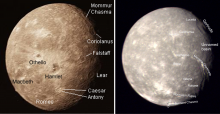Listen to today's episode of StarDate on the web the same day it airs in high-quality streaming audio without any extra ads or announcements. Choose a $8 one-month pass, or listen every day for a year for just $30.
You are here
Arthur C. Clarke
CLARKE: The next stage in evolution may be electronic or, if you like, mechanical, and the organic entities such as us represent an intermediate stage. And we may be superseded by the ultraintelligent machines, and they, in turn, may be superseded by perhaps pure energy, or spirit.
Although it sounds like something someone might say today, that prediction is from a radio interview in 1968. But then, Arthur C. Clarke always was a bit ahead of his time. He wrote about geosynchronous satellites two decades before they flew, and smartphones two decades before they were invented. And he penned some of the most scientifically valid science fiction ever written.
Clarke was born 100 years ago today, in England. As a boy, he built his own telescope, and was mesmerized by an early sci-fi magazine.
During World War II, he served as a radar technician. After the war, he was a writer — first of science fact, then science fiction. A 1945 article outlined a network of geosynchronous satellites. And his first sci-fi short story was published the following year, in the same magazine that had captivated him as a youngster.
Clarke’s popularity soared when he co-wrote the screenplay for 2001: A Space Odyssey, for which he earned an Oscar nomination. Clarke based that and his other stories on solid science and a sense that everything would work out in the end.
And when Clarke died, in 2008, at the age of 90, he was working on yet one more story of science and adventure.
Script by Damond Benningfield
The interview clip is from Pacifica Radio in 1968. Listen to the full interview.






